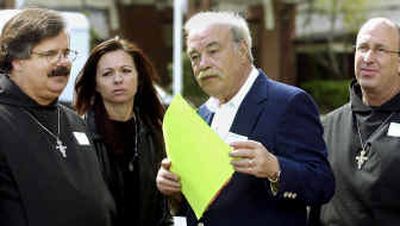Schiavo’s case brings together odd alliance

Terri Schiavo isn’t the perfect symbol for the anti-euthanasia movement. She didn’t end up in a coma while saving a child from a speeding bus, for instance.
Instead, she struggled with an eating disorder that led to her heart attack, though even this detail is in dispute now.
She’s not the perfect symbol, but the women and men who spark societal debate on issues rarely are. O.J. Simpson, a flawed man indeed, allowed the country to finally understand how people see justice issues in very different black-and-white ways. And now we have Schiavo.
I wasn’t going to write about Schiavo today, because everybody else is, and because my personal opinion on the whole thing boils down to one sentence: Let her pass on in peace, and quit vilifying her husband.
But then I grew intrigued with the people who have physically and ideologically rallied around Schiavo’s cause.
Those Franciscan friars from Minnesota, who accompany Schiavo’s parents to court hearings and press conferences, look like characters from a medieval morality tale.
And disability rights Web sites are ablaze with articles and chat-room comments in Schiavo’s defense.
“Go to Florida now and get your bumper stickers while they last saying, ‘Kill a human but save a whale,’ ” wrote Keith Kessler, founder of the national Disabled Action Committee.
Marshall Mitchell, a column regular who teaches disability studies at Washington State University, forwarded Kessler’s op-ed article to me.
Disability rights activists are squarely on the Keep-Terri-Schiavo-Alive side of this ethical toggle, in solidarity with conservative Republicans.
The irony has not escaped Marshall. He and most other disability advocates tend to be liberal Democrats, dismayed at conservative Republican platforms that chip away at equal rights for people with disabilities.
But these liberals are lining up with these conservatives on this issue, because they believe that if it’s OK to kill Schiavo, then it will be OK to kill them someday, too.
Kill the guys and gals who use respirators, wheelchairs and personal assistants and who sometimes need government funding to lead lives of dignity.
“Politics make for strange bedfellows,” Marshall lamented. “But I don’t believe disability rights advocates will find in the long run that the Republicans are really our allies.”
Nevertheless, Marshall welcomes the high-profile case, because of the dialogue it’s generating among people who don’t usually debate life-or-death issues. The Daily Evergreen, WSU’s student paper, even did a person-in-the-street interview on it this week.
He’s pleased with all this, but he wishes that some of the less sensational euthanasia cases had awakened in the national consciousness, too.
For instance, a man named Larry McAfee became a quadriplegic after a motorcycle accident in 1985. Languishing in a nursing home, he petitioned the Supreme Court of Georgia for the right to be unhooked from his respirator. The court agreed.
But then, as word spread of McAfee’s dire situation, disability advocates helped McAfee get out of the nursing home and into a more independent environment. He chose to live.
And there was the case of Tracy Latimer, a 12-year-old Canadian girl with severe cerebral palsy. Her father gassed her to death in the cab of his Chevy pickup in 1993. Appeals in the father’s murder conviction dragged on for seven years, due to a public outcry to let the father off for this “mercy” killing.
“If he had done it to any of his other kids, they would have thrown him in jail and thrown away the key,” Marshall said.
The McAfee and Latimer stories didn’t garner much media attention, so the disability-rights advocates are hoping the Schiavo case will advance their right to live with dignity before worrying about death with dignity.
Meanwhile, I hope Terri Schiavo will soon rest in peace away from all of us – the media, the activists and even those well-meaning Franciscan friars.